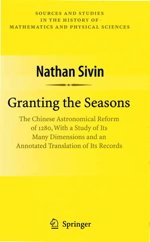You are here
2011 Osterbrock Book Prize Winner - Nathan Sivin
Nathan Sivin Awarded the 2011 Donald E. Osterbrock Book Prize for Granting the Seasons
by Sara J. Schechner
 The Donald E. Osterbrock Book Prize of the Historical Astronomy Division is a new biennial award that recognizes the author(s) of the book judged to best advance the field of the history of astronomy or to bring history of astronomy to light. The first prize will be awarded in 2011 to Nathan Sivin for Granting the Seasons: The Chinese Astronomical Reform of 1280, With a Study of Its Many Dimensions and an Annotated Translation of its Records (New York: Springer, 2009). Sivin is Professor of Chinese Culture and of the History of Science, Emeritus at the University of Pennsylvania.
The Donald E. Osterbrock Book Prize of the Historical Astronomy Division is a new biennial award that recognizes the author(s) of the book judged to best advance the field of the history of astronomy or to bring history of astronomy to light. The first prize will be awarded in 2011 to Nathan Sivin for Granting the Seasons: The Chinese Astronomical Reform of 1280, With a Study of Its Many Dimensions and an Annotated Translation of its Records (New York: Springer, 2009). Sivin is Professor of Chinese Culture and of the History of Science, Emeritus at the University of Pennsylvania.
Based on 40 years of research, the book offers readers a nuanced and intricate exploration of what is considered to be the most important and sophisticated Chinese astronomical treatise, the "Season Granting System [shou shi li]." This treatise contained a new set of methods for generating annual almanacs. It took its name from the ritual of the emperor officially promulgating these almanacs and bestowing the seasons on the people each year as an official act of maintaining harmony between the cosmos and the state.
The "Season Granting System" dates from the early years of Mongol rule over China. Khubilai Khan used the ambitious astronomical reform project as a symbolic means to inaugurate the Yuan Dynasty (1276-1368) and more critically to legitimize Mongol rule over the conquered Chinese.
 In the first half of the book, Sivin delves deeply into the cultural, political, bureaucratic, personal, and technical aspects of the astronomical project. "I aim," Sivin says, "to portray the technical methods of astronomy as part of a continuum that enfolds every dimension of human activity, from algorithms to political maneuvering." To this end, he examines the reform from the vantage points of Chinese astronomers and mathematicians, monks and political advisors, timekeepers and students, editors and printers, and "civil-service generalists." Sivin explores how and why Khubilai Khan invested unprecedented resources in astronomy at the urging of his Chinese advisors. He describes the Chinese methods of computation and observation, the layout of the observatory and the development of new instruments, the nature of ancient astronomical records, and the previous history of astronomical reforms in China. Along the way, Sivin offers comparisons with contemporary European and Muslim astronomical work and considers whether there were exchanges between Islamic and Chinese astronomers.
In the first half of the book, Sivin delves deeply into the cultural, political, bureaucratic, personal, and technical aspects of the astronomical project. "I aim," Sivin says, "to portray the technical methods of astronomy as part of a continuum that enfolds every dimension of human activity, from algorithms to political maneuvering." To this end, he examines the reform from the vantage points of Chinese astronomers and mathematicians, monks and political advisors, timekeepers and students, editors and printers, and "civil-service generalists." Sivin explores how and why Khubilai Khan invested unprecedented resources in astronomy at the urging of his Chinese advisors. He describes the Chinese methods of computation and observation, the layout of the observatory and the development of new instruments, the nature of ancient astronomical records, and the previous history of astronomical reforms in China. Along the way, Sivin offers comparisons with contemporary European and Muslim astronomical work and considers whether there were exchanges between Islamic and Chinese astronomers.
In the second half of the book, Sivin translates and offers technical commentary on the "Season Granting System." The text contains instructions in new mathematical methods and the use of instruments, which Sivin carefully lays before the reader. The "Season Granting System" also contains a long "evaluation" section describing in detail the astronomical and mathematical methods endorsed by prior astronomical reforms. This section preserves over 1000 years of astronomical thought and activity, and Sivin's translation makes this history accessible to a wide audience.
Sivin's work is a monumental weaving of many historical threads and a study of the social and scientific fabric they create. This book will be a standard reference on Chinese astronomy and a starting point for many further studies in astronomy, society, and history. Sivin, moreover, throws down a gauntlet to Western and Eurocentric scholars urging them to pay more attention to Indian, Muslim, Asian, and non-European traditions in astronomy and consider their role in the formulation of Western modern science.
Granting the Seasons: Publisher’s description; Reviews
